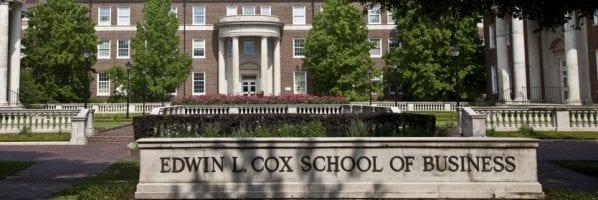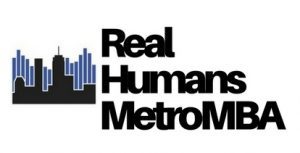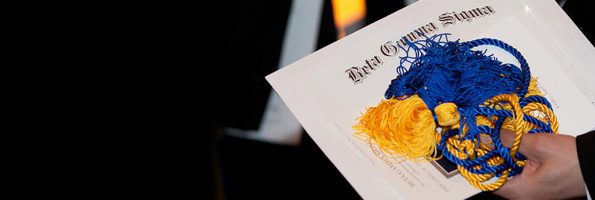Real Humans of the SMU Cox School of Business

After 100 years, one can expect a few changes.
The Southern Methodist University Cox School of Business, nearing it’s centennial celebration, is a perfect test-case for how much change can mean. Founded in 1920 as the Department of Commerce, the Dallas metro business school has gently evolved from a modern Methodist research beacon into one of the most transformative schools in Texas.

With over 11,000 students at SMU, including 5,170 graduate students, the Cox School of Business hosts nearly 600 MBAs in its various programs. For any Cox student, one of the definitive advantages of the business school is the advantageous proximity to Dallas’ thriving business community. Ten companies in the metro land within the Fortune 500 ranking. Among the group, four companies—Exxon Mobil, AT&T, Energy Transfer Equity, and American Airlines Group—land in the top 100, with two in the top ten. With high national regard, including a top 50 ranking for the school in U.S. News & World Report, plus the bevy of major companies as neighbors, these factors can seem overwhelmingly beneficial to a successful career.
When talking with members of the SMU Cox School of Business Professional MBA class, however, the allure of the program went beyond the obvious career benefits that Dallas can offer. For any well-regarded business school, the makeup of the class can seem familiar. The average GMAT for the PMBA Class of 2019 is 613. The GPA is 3.3. Most of the group has about five years of prior professional experience before enrollment. But just going off the bare statistics hardly tells the entire story.
To get a greater understanding of the SMU Cox School of Business Professional MBA class, we spoke with several current students, including a self-described “Army Brat,” a former law school student, and a consultant originally from Kathmandu, along with a handful of other future grads. Read on to see their stories and what the future may hold for life after an MBA.
The Best Part-Time MBA Programs You Can Find in Seattle

For those who feel stuck in a middle management position, getting an MBA is a great way to get a leg-up on competition and put yourself in the running for higher-level opportunities. Unfortunately, a 9-to-5 job does not leave much time to devote to full-time learning.
However, the majority of MBA programs offer flexible, hybrid, or part-time options to accommodate all sorts of schedules. Below, we offer a rundown on the three best Seattle part-time MBA programs.
The Best Seattle Part-time MBA Programs
Seattle Pacific University School of Business, Government and Economics
At the Seattle Pacific University School of Business, Government and Economics, a full-time career does not have to deter motivated professionals from pursuing higher education. SPU’s part-time program consists of evening and weekend classes, and is designed to fit into a busy schedule. The university markets the program specifically to established professionals looking to integrate valuable MBA knowledge and skills into their current position.
The 45-credit program consists of ten advanced courses and five elective courses. Selecting an emphasis can help professionals tailor their education to their specific business needs. Students can choose any of the following emphases: Human Resource Management, Finance, Management, Cybersecurity, Data Analytics, Social and Sustainable Business, or Information Systems Management.
SPU’s part-time program might appeal to professionals who prioritize integrity and wish to make a positive contribution to their workplace and community. The university requires at least two ethics courses, and underscores the importance of morality in business.
Foster School of Business—University of Washington
The UW Foster School of Business has several options for aspiring MBAs who cannot commit to a standard full-time program. Foster offers an Evening MBA, a Hybrid MBA, and an Executive MBA to accommodate various lifestyles.
Forster’s Evening MBA takes three years to complete. Students in this program have an average of almost seven years of work experience, making this track a great option for more seasoned professionals looking to enhance their contributions at their jobs, or perhaps looking to make a late career change.
The Executive MBA (EMBA) at Foster may also be the right choice for those looking for a program that is compatible with full-time work and life obligations. Though not limited to executives, the EMBA is specifically designed for seasoned professionals seeking knowledge they can apply in their professional lives right away. The 21-month program provides the option to take classes weekly or monthly, to meet the needs of those who might have to commute.
If finding time to commit to on-campus courses seems difficult, Foster’s Hybrid MBA might be a good fit. The program involves quarterly in-person sessions, and the rest of the coursework takes place online.
Albers School of Business and Economics—Seattle University
Seattle University’s Albers School of Business and Economics offers students in the Professional MBA (PMBA) the chance to pursue their degree part-time. This program is ideal for students who want to tailor customize their education to fit their interests and career goals, as electives comprise two thirds of the 54 required credits. Students on the PMBA track must have a minimum of two years of work experience. Graduates of this program have gone on to high-level positions at companies like Nike and Microsoft.
Kogod Takes Global Leadership Top Honors

Last November, Kogod School of Business PMBA students Kelsey Branch and Christopher Correnti attended the The Beta Gamma Sigma (BGS) Global Leadership Summit in Dallas, Texas. Continue reading…
Sellinger Students Visit Chile on Study Tour Abroad

For the past 13 years, Loyola Maryland Sellinger School of Business has sent groups of students to the South American country of Chile. This annual study tour is a nine day long excursion where students visit a winery, a local hospital and a hyperbaric chamber in order to understand how businesses operate in South America, as well as enjoy the beautiful scenery and food. Continue reading…
Rutgers Alumnus Shares PMBA Experience

Dan Zuccarello waited more than 30 years to return to school for his MBA. On May 21, he graduated from the Rutgers School of Business-Camden. Zuccarello, who currently serves as a manager of the quality control laboratory at Daiichi-Sankyo, a global pharmaceutical company in Bethlehem, Pa. began his MBA program in the 1980s at Rutgers School of Business- New Brunswick.
After reading an advert for the program that he received in the mail, explaining that the program only met on Saturdays and attending an information session on the Professional MBA program offered at the Rutgers-Camden campus, Zuccarello decided it was time to go back to finish his MBA. “I always felt my career was limited because I was only a scientist,” Zuccarello told Rutgers News. “I had no business background and all of my education was in biology and chemistry. I was an analytical chemist for 35 years, but was running a business. I was being asked to handle finance, accounting, and human resources and I had no background in it. I wasn’t a fish completely out of water, but I wasn’t comfortable.”
Kogod’s Second Professional MBA Cohort Takes the Classroom to Brazil

Prospective MBAs in the Kogod School of Business Professional MBA cohort spent a portion of their 27-month program make connections outside of the DC metro. After months of planning and preparing, the cohort, the second in the program’s history, departed for one of South America’s most emerging markets, Brazil, for an eight-day international stay.
“The overarching goal of the program is for students to learn and understand how business is conducted in a developing economy,” said Jolie Roetter, Kogod’s director of global learning, in a news article on the Kogod website. Continue reading…
